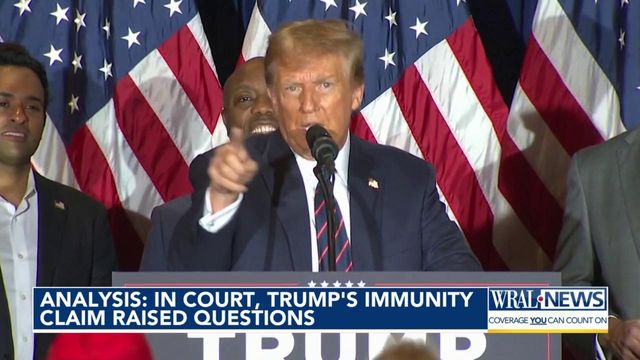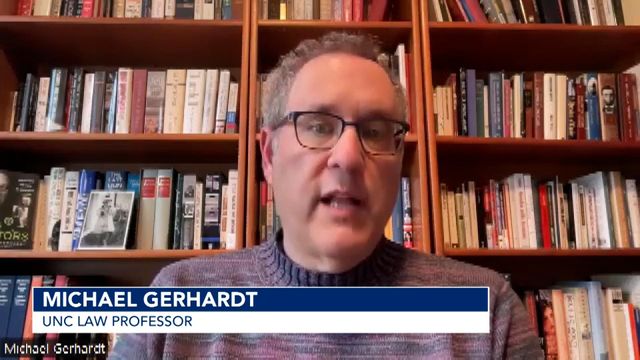Donald Trump's immunity claim will likely delay trial, UNC law professor says
Former President Donald Trump is claiming immunity from prosecution in the election interference case. University of North Carolina at Chapel Hill law professor Michael Gerhardt explains how the claim will likely delay the trial.
Posted — UpdatedA three-judge panel of the federal appeals court in Washington is weighing former President Donald Trump’s claim that he is immune from prosecution in the election interference case.
Trump is charged with plotting with his Republican allies to subvert the will of voters in a desperate bid to stay in power after the 2020 presidential election. U.S. District Judge Tanya Chutkan, who rejected Trump's immunity claim, has put the case on hold while he pursues his appeal.
How presidential immunity ruling led to President Richard Nixon’s resignation
WRAL News examined the concept of presidential immunity, how it has played into politics in the past and how it fits into this case.
On July 24, 1974, the U.S. Supreme Court made a decision that played a key role in President Richard Nixon’s resignation. It essentially forced the release of the Watergate tapes, – the “smoking gun” White House conversations.
The ruling determined Nixon’s status as president did not make him immune from being forced to release the tapes. The U.S. Constitution also does not give a free pass.
Article I, Section 3, Clause 7, says people who are impeached can still be “liable and subject to Indictment, Trial, Judgment and Punishment, according to Law.”
The U.S. Justice Department addressed the issue of presidential immunity during the investigations of Nixon and of President Bill Clinton in the 1990s.
Back in the fall of 1973, as the Watergate scandal was heating up, the Department of Justice’s Office of Legal Counsel wrote a lengthy memo stating “an indictment hanging over the president while he remains in office would damage the institution of the presidency virtually to the same extent as an actual conviction.”
How courts will determine Trump’s immunity claim
Fifty years after that Supreme Court decision, the U.S. District Court of Appeals for the D.C. Circuit will likely consider that precedent as it weighs the elections interference case.
To help us understand what Trump’s lawyers are arguing and how Special Counsel Jack Smith is responding, WRAL News spoke with University of North Carolina at Chapel Hill law professor Michael Gerhardt, who was one of four constitutional scholars called by the House Judiciary Committee during then-President Trump’s impeachment hearings.
WRAL News asked Gerhardt about what the clearest writing is to guide the panel of judges as they work through the case.
“I think the clearest thing is that everything we know about the Constitution directly undercuts Trump’s lawyer’s argument,” Gerhardt said. “So, it’s undercut by the text of the Constitution, it’s undercut by the U.S. Supreme Court decision, it’s undercut by historical practices, and it’s undercut by the basic principle in American law that no one is above the law.”
WRAL News also asked Gerhardt about how one of the Court of Appeals judges brought up a hypothetical during this most recent hearing on this case. The judge asked if a president could order SEAL Team Six to assassinate a political rival and not be prosecuted. Trump’s attorney, John Saur, said first he would need to be impeached. WRAL News asked Gerhardt what he made of the argument.
“It’s a crazy argument,” Gerhardt said. “It’s wrong, and I think the judges were rightfully quite skeptical of it. It makes no sense at all.
“Trump’s lawyers are arguing that unless the president has been impeached, convicted and removed for criminal misconduct, the president may never be criminally responsible for that particular criminal misconduct. It’s absurd, and one reason why it’s absurd is criminal proceedings are not the same as impeachment proceedings. There’s language in the constitution as you pointed out that suggests that legal or criminal proceedings are one thing, but impeachment is another.
“Reverse that, if someone is impeached convicted and removed, they may still be liable at law for whatever they did. The order or sequence of proceedings doesn’t really matter.”
• Credits
Copyright 2024 by Capitol Broadcasting Company. All rights reserved. This material may not be published, broadcast, rewritten or redistributed.






